June 14
Robert M. La Follette Sr.
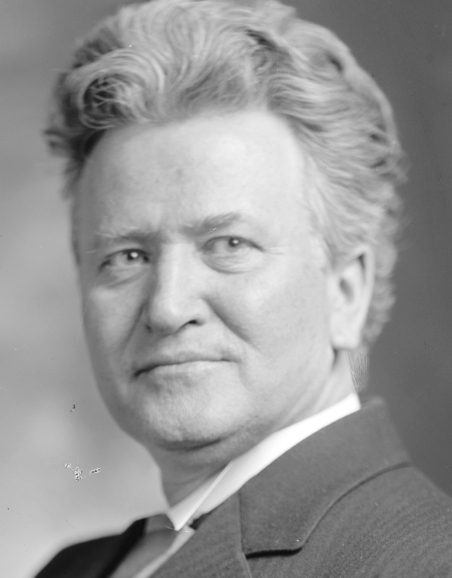
On this date in 1855, Robert Marion “Fighting Bob” La Follette Sr. was born in a log cabin in Primrose Township, Dane County, Wisconsin. From humble roots, he rose to political prominence as Wisconsin governor, senator and presidential candidate. A 1982 survey of historians ranked him among the “ten greatest senators in the nation’s history.”
Nicknamed “Fighting Bob” for his fierce independence, La Follette put principle before party and backed progressive causes and reforms such as women’s suffrage, a minimum wage, workers’ compensation and child labor laws. His wife, Belle Case La Follette, was a leader in the feminist movement and influenced her husband’s ideas and programs. His friend, Emma Goldman, called him “the finest, most inconsistent anarchist” of his time for his willingness to take on the established order.
La Follette earned a law degree, served as Dane County district attorney and was elected to three terms in the U.S. House as a Republican before losing to a Democrat in 1890. Elected governor in 1900, he enacted a progressive agenda in cooperation with the state university system, sometimes referred to as the Wisconsin Idea, that ran counter to the interests of the Republican “Stalwarts.” His message about the danger of “vast corporate combinations” got him national attention. In 1906 he was appointed by the state Senate to the U.S. Senate (senators weren’t directly elected until 1914).
La Follette began to be recognized as head of the national party’s progressive wing and in 1909 he started La Follette’s Weekly, still being published in Madison (as of this writing in 2019) as The Progressive. He strongly opposed U.S. entry into World War I, a position which lost him allies in academia. In some quarters he was reviled as “the most-hated man in America” for his positions on peace and civil rights.
Reelected to the Senate in 1922, he ran for president on the Progressive Party ticket in 1924 and got almost 5 million votes in a race won by Calvin Coolidge. “America is not made, it is in the making,” La Follette once said. “Mere passive citizenship is not enough. Men must be aggressive for what is right if government is to be saved from those who are aggressive for what is wrong.” He died of cardiovascular disease complicated by pneumona and bronchitis four days after his 70th birthday in Washington, D.C. (D. 1925)
“[Robert] Ingersoll had a tremendous influence upon me, as indeed he had upon many young men of that time. It was not that he changed my beliefs, but that he liberated my mind. Freedom was what he preached: he wanted the shackles off everywhere. He wanted men to think boldly about all things: he demanded intellectual and moral courage. He wanted men to follow wherever truth might lead them. He was a rare, bold, heroic figure.”
— "La Follette's Autobiography: A Personal Narrative of Political Experiences" (1913)
Margaret Bourke-White
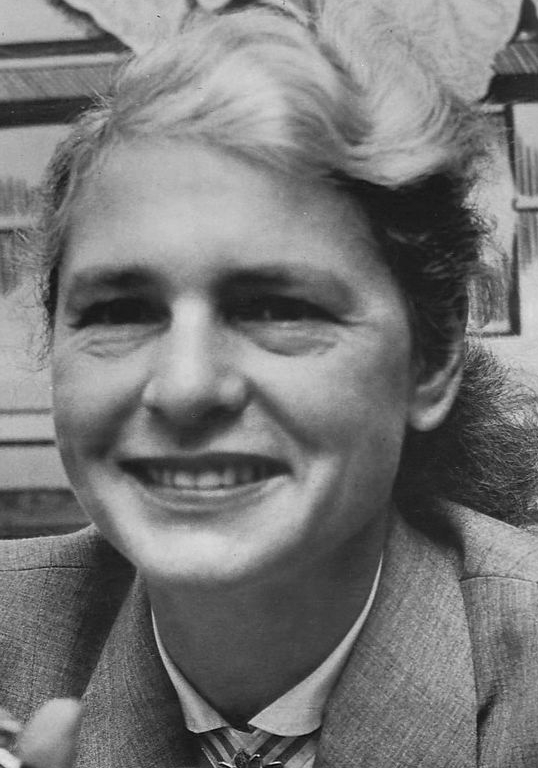
On this date in 1904, Margaret Bourke-White was born in Manhattan, the daughter of a couple who had been married by Felix Adler, founder of Ethical Culture. Her mother, Minnie Bourke, an Irish American, was a progressive feminist and reportedly an ardent atheist, who always told Margaret she was “invited into the world” as a planned child. Her father, Joe, an amateur inventor, encouraged Margaret’s intrepid interest in snakes and wild pets. Margaret graduated from Cornell in 1927 with a degree in herpetology (study of reptiles).
She was hired by Henry Luce to become a staff photographer for the nascent Time magazine. In 1930 she talked herself into Russia, filming as she traveled the Trans-Siberian Railway. She became Life’s first woman photographer and the first woman to have a photograph on its cover. In 1937 her book of haunting photographs of the Depression, with text by Erskine Caldwell, was published.
She was married twice, briefly as a very young woman, and from 1939-42 to Caldwell. Bourke-White became the first major female war correspondent, covering the invasion of Russia, traveling to North Africa by way of a convoy, which was torpedoed, documenting the war in the Pacific, the liberation of Italy and the liberation of the Nazi death camps. She met Gandhi several times, taking a photo of him spinning fabric just hours before he was assassinated. Her unforgettable photographs of South Africa informed the world of the injustice of apartheid.
She had surgery in 1956 for Parkinson’s disease and more surgery in 1961, which left her with impaired speech. In 1971 she fell and died later that year. Her books include Eyes on Russia (1931), Shooting the Russian War (1942), Purple Heart Valley: A Combat Chronicle of the War in Italy (1944), Dear Fatherland, Rest Quietly: A Report on the Collapse of Hitler’s “Thousand Years” (1946), Halfway to Freedom: A Report on the New India (1949) and Portrait of Myself, an autobiography (1963).
PHOTO: Bourke-White in 1955 on “Person to Person” on CBS.
"It was a strange little scene. Women were careening about in their cotton print dresses, and several times they nearly threw me off my feet and all but knocked my camera out of my hands as they waved their Bibles and shrieked their ‘Praise Be’s.’ “
— Bourke-White, "Portrait of Myself" (1963)
Wafa Sultan
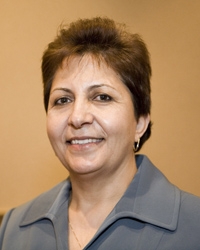
On this date in 1958, Wafa Sultan was born in Banias, Syria. Sultan received her degree in medicine at the University of Aleppo, where she says she lost her faith in Islam after seeing one of her professors gunned down by the Muslim Brotherhood. In 1989 she and her husband emigrated to Los Angeles with their children.
Sultan has written essays critical of Islam, some published on the reform website Annaqed (The Critic). In 2005, Sultan gained notoriety for her appearance on Al Jazeera debating a Muslim cleric and asking, “Why does a young Muslim man, in the prime of life, with a full life ahead, go and blow himself up? In our countries, religion is the sole source of education and is the only spring from which that terrorist drank until his thirst was quenched.”
In 2009 she published her first book in English, A God Who Hates: The Courageous Woman Who Inflamed the Muslim World Speaks Out Against the Evils of Islam. She describes herself as a cultural Muslim. In 2006 she received FFRF’s Freethought Heroine Award.
“I receive too many emails from women in the Islamic world, telling me: ‘Go ahead, we are behind you,’ but unfortunately they’re afraid for their lives.”
— Sultan, speaking to FFRF's 2006 national convention
Mary Morain
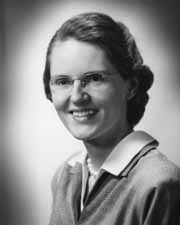
On this date in 1911, Mary Stone Dewing Morain was born in Cambridge, Mass. She studied social work and therapy and earned her master’s degree from the University of Chicago. Morain spent time as president of the International Society for General Semantics and was a member of its board of directors and executive committee.
Morain served on the birth control boards in Massachusetts and California in the 1940s and 1950s and supported Planned Parenthood. She married Lloyd Morain in 1946. She devoted much of her life to popularizing humanism and supporting worldwide humanist organizations. In 1954 she and Lloyd published Humanism As the Next Step, which explained the basics of humanism. She and Lloyd founded the International Humanist and Ethical Union in 1952. In 1994 they won the American Humanist Association’s Humanist of the Year Award jointly.
She died in 1999 after contracting pneumonia.
"Believing that we exist only in a single world, the natural world that we share with other living creatures, and that we have no special first-class tickets that allow for travel to continuous existence in other spheres at the end of our journey in this life. In our human distresses, we have only each other to turn to for help."
— Morain, 1994 Humanist of the Year acceptance speech
Ernesto “Che” Guevara
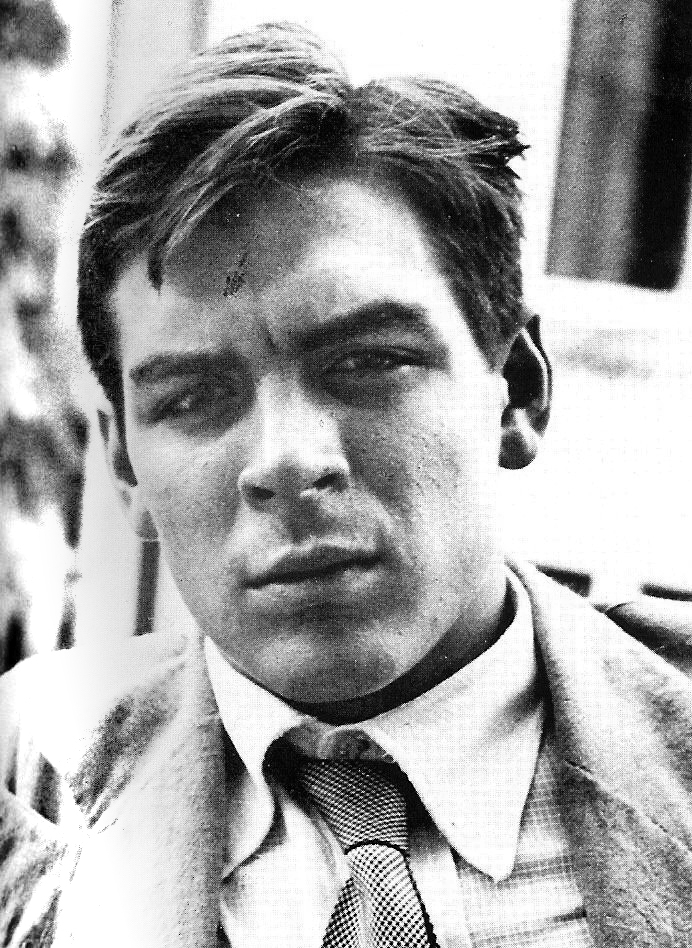
On this date in 1928, revolutionary Ernesto “Che” Guevara was born in Rosario, Argentina. Guevara began to study medicine in 1948 at the University of Buenos Aires but interrupted his studies to take trips around Latin America. It was on one of these trips that he wrote his famous Motorcycle Diaries. On his journey he became more aware of poverty and inequality throughout Latin America, an experience that strongly influenced him throughout his life. He resumed his studies in Argentina in 1953 and finished medical school, almost immediately resuming travel through South and Central America.
Guevara met Raul Castro in Mexico and soon after joined the Cuban guerillas to fight against dictator Fulgencio Batista. He married Aleida March in 1959 and they had five children: Hilda, Aleida, Camilo, Celia and Ernesto. Guevara became a leader in Cuba’s revolution and as a military adviser led troops. As part of Fidel Castro’s government, Guevara was put in charge of La Cabana Fortress prison in 1959. It is believed between 156 and 550 people connected with Bastista were executed there on Guevara’s orders, outraging the international community. He was named finance minister and president of the National Bank, where, in order to show his disdain for money, he signed bills with just his nickname Che.
He was known for advocating for the poor, for being uncompromising, confrontational and a “true believer” in communism, killing political enemies without compunction. Guevara employed guerrilla warfare in Cuba, Bolivia and the Congo. The CIA-backed Bolivian military executed him on Oct. 9, 1967, while he was trying unsuccessfully to incite the people of Bolivia to rebellion. One of the most controversial figures of the 20th century, he is remembered by some as a cultural icon and by others as a ruthless ideologue and murderer. (D. 1967)
” I am all the contrary of a Christ. … I fight for the things I believe in, with the weapons at my disposal and try to leave the other man dead so that I don’t get nailed to a cross or any other place.”
— Guevara, letter to his mother, July 15, 1956
